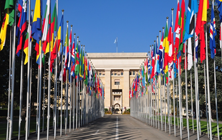Friday, February 22nd
Whether you know it or not, everything we touch is chemical. The food we eat, the dishes we use, our clothes, medicines, computers, cars, shampoo, door handles, pillows, combs – everything.
The Global Chemicals Outlook (GCO II) makes it clear that chemicals are a necessity for development – but it is the possible unsound management of them that calls for ambitious, urgent and worldwide action from governments, policy makers, the private sector, intergovernmental organisations, civil society, industry and the general public.
n 2020, a new global approach for the sound management of chemicals and waste is expected to be adopted based on the outcomes of the ‘Beyond 2020’ process, spearheaded by the stakeholders of the Strategic Approach to International Chemicals Management (Saicm). Therefore, our actions towards ensuring the safe management of chemicals and waste in 2019 is paramount in how the world moves forward in advancing and strengthening global efforts to act on chemicals and waste at all levels.
Plastic waste is emerging as one of our greatest environmental challenges. Today, most plastics are non-biodegradable, slowly breaking down into smaller fragments called microplastics, which can take decades, centuries or more to decompose. UN research revealed that nearly 800 species are affected by marine litter – and the finger is often pointed at the plastics industry. Yet, did you know that we release half a million tonnes of plastic microfibres (released as primary microplastics) into the ocean every year by washing textiles?
To read the full article click here
